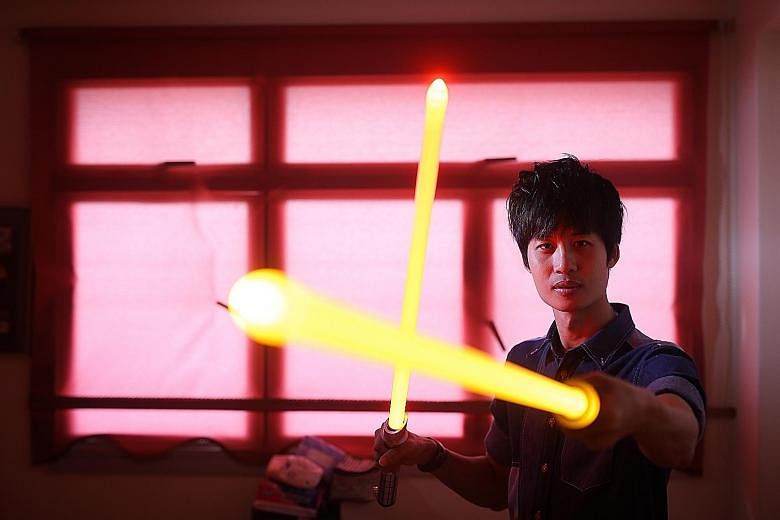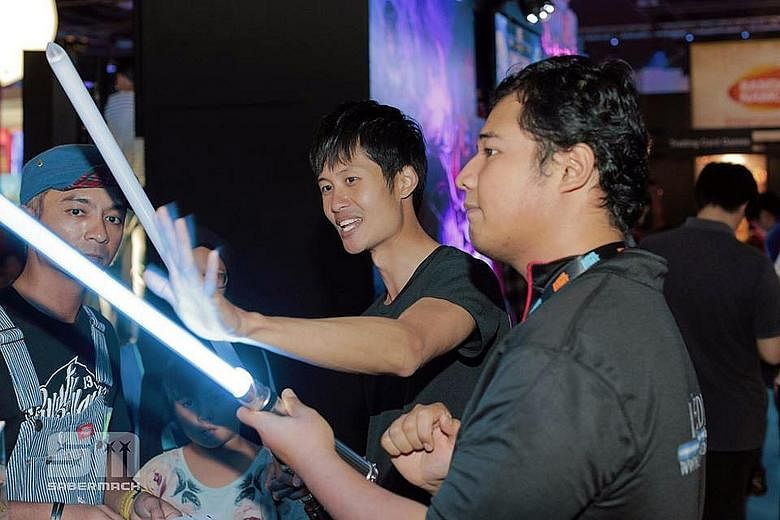When Mr Jay Chen was 16, he sold several treasured toys from his collection, including a rare Transformers Fortress Maximus worth about $900. After cobbling together about $3,000, he bought a World War I British rifle grenade from a collector in Britain.
He lusted after the relic for a simple reason. In George Lucas' Star Wars (1977), the lightsaber wielded by Obi-Wan Kenobi was made from, among other things, the clamp of a three-cell Graflex flash handle, an Armitage Shanks faucet knob and a No. 3 MK1 rifle grenade - the same one that he bought.
A film prop junkie who was especially rabid about lightsabers, the teenager wanted to assemble the Jedi master's weapon with all the parts used by the movie's prop-maker. But before he did that, he sent the grenade to a machinist and asked him to do several replicas.
The machinist charged him $300 for each; he, in turn, flogged them on eBay for US$280 a pop. The exchange rate then was $1.70 to every greenback.
Movie prop collectors snapped them up. "In just one month, I did $13,000 in sales," he says.
Mr Chen, 31, is still obsessed with lightsabers. Two years ago, he founded Sabermach, Singapore's only lightsaber-making outfit.
Last September, the firm launched its range of combat lightsabers, built for heavy-duty use and priced between $449 and $849, at a toy convention in Marina Bay Sands.
Orders surged in by the hundreds. Distributors in Hong Kong, Thailand and the Philippines have already inked deals with Sabermach, which is also finalising talks with interested parties from other countries such as the United States.
It is sweet validation for the entrepreneur whose career choice once filled his father with despair.
He is the younger of two children. His father, a retired company manager, is now an Uber driver; his mother works in an electronics company.
Lean, with his delicate features framed by a mop worthy of a Korean pop idol, Mr Chen has been crazy about toys for as long as he can remember. He started off collecting action figures from TV animated series such as Transformers and M.A.S.K.
Clued in to what was hot and valuable by reading toy magazines, he was trading action figures with his friends and classmates by the time he was nine.
The former weekend flea market at Clarke Quay was his favourite haunt. When he was 14, he partnered geeks several years older to rent a table and set up shop for $60.
"I would trade and buy things I was not interested in but were sought after. Sometimes, I would buy something early in the morning and sell it in the afternoon. I could make up to $100 a day," says the former student of Qihua Primary and Riverside Secondary. "The older boys would tell customers: 'Don't look down at that scruffily dressed kid. He makes a lot of money'," he adds with a grin.
One of the best life skills he picked up at Clarke Quay, he says, was the art of negotiation.
"I realised that people often buy something not because a product is good or cheap. Humans are driven by emotions. If you can convince a person why he needs something bad enough, it does not matter what the price is. He will want it."
After a while, Mr Chen shifted his attention from toys to movie props.
While surfing the Internet one day, he chanced upon a lightsaber. He did not know it then, but it was to change his life.
"Someone was selling a Luke Skywalker lightsaber. It was poorly made by today's standards: a torch with a metal handle, with an acrylic tube sprayed with green paint. If you switched it on, it would illuminate," says the Star Wars fan, who shelled out more than US$300 for it.
Because movie props were a lot more expensive than toys, he started selling some of his collectibles to indulge his new passion.
"After a while, I could not afford them any more," he says.
So he did the next best thing: He started making lightsabers himself.
He scoured the Internet to buy parts, read manuals and stayed back in the school workshop after lessons. He even managed to coax his father to buy him a $1,600 lathe, although the latter forbade him to use the machine after a while because it was too dangerous.
"This is the first sabre I made," Mr Chen says, flashing a picture in his smartphone. "This is a bicycle grip, that is a pen cap I bought from my friend," he says, pointing to different parts on its handle.
"I became more and more obsessive. Since it was not a cheap hobby, the only way I could make more was to sell them," he says.
That he did by advertising his handles and blades in online fan forums. The response was overwhelming.
Once he had enough orders, he would approach a machinist to help him fashion complicated parts.
"He charged me $50 for one of my handles and I would sell it for US$55. I sold hundreds of them to online buyers in the US. Singaporeans found them too expensive."
His obsession affected his studies and he flunked his O levels.
Fortunately, he fared a lot better when he redid the exams the next year at a private college.
He decided to study chemical process technology at the Singapore Polytechnic although mechanical engineering would have been a better option, given his interest.
It was a big mistake.
He ended up failing one subject so badly he was asked to leave the course in his second year.
His mother and elder sister tried to plead his case with the department head but to no avail.
"My friends call me the PhD - the Poly Half Dropout. All my course mates graduated... except me."
For three months, Mr Chen kept the news from his father.
"One day, when he was in a good mood, I told him. All hell broke loose; he was very angry with my mother and sister."
National service came next. Life was hectic and kept him from his passion for two years.
"The sabre business progressed by leaps and bounds, and I was not keeping up to speed," he recalls.
But he plunged back into it after his release from the army. By then, he knew he wanted to earn his keep making lightsabers. "It is the only thing I know and enjoy," he says.
The decision did not go down well with his father, but Mr Chen would not have it any other way.
The custom-made lightsabers are not like the licensed replicas made by the likes of toymaker Hasbro.
"Licensed replicas are idealised, with imperfections removed and edges smoothened. Prop collectors... want their replicas to be as close to the stuff used in the movies even if they may be asymmetrical or have an uneven grip," he says.
"As a collector myself, I know what collectors want."
For four years, he beavered away.
"I had to go to forums to understand all about ohms and resistors, how to solder, how to cut.
"Everything I know about precision engineering, I learnt myself. Even with the current level of education in Singapore, if you graduate in precision engineering, you may still not be able to operate this," he says, pointing to his trusted old lathe.
The early days were rocky.
To bolster his income, he helped oil and gas companies cut pieces of metal into different lengths with his machine. Some months were so lean that he would make only a couple of hundred dollars.
"I made enough to feed myself. I lived with my parents and did not have to spend on anything else. I was convinced I wanted to continue doing this," he says.
The doggedness, he reckons, came from his Clarke Quay days.
"As a child, I saw how some businesses grew. I told myself that as long as I keep at it long enough, something will happen."
His faith was not misplaced. From individual parts, he started making full lightsabers. As his reputation as an artisan grew, he started getting more commissions.
He charged $45 an hour for some of the more complicated designs and was soon making a few thousand dollars a month. Because he was frugal, he managed to squirrel away some savings.
In 2013, he got married to a home tutor. "I had to start thinking about buying a flat and starting a family," says Mr Chen, who recently picked up the keys to a four-room HDB flat in Woodlands.
He decided he had to go mass market, and plonked his savings into starting Sabermach in January 2014. He rented a small space in his friend's furniture workshop in Yishun, invested in two other machines and spent the next 18 months doing research and development before coming up with six new designs.
Each Sabermach lightsaber is handcrafted from an anodised aluminium tube. Among other things, those from the top-of-the-line Master series come with a light-up sound and flash when they make contact with another lightsaber.
"We are the only ones making premium sabres with display cases and proper packaging," says Mr Chen, who roped into Sabermach a friend specialising in acrylic display cases last year.
At a Star Wars event last year, he also met another lightsaber-maker, Mr Kit Woo, who owned his own brand, Kit Sabers.
Sabermach's six lightsabers were launched to overwhelming response at the toy convention in Marina Bay Sands last year.
"Kit offered to help me assemble the sabres as a friend before the convention last year. I would have died if I had to do it alone," he says, adding that Mr Woo has since closed his own outfit and joined Sabermach as a creative director.
The company now boasts a team of six, including a media consultant and an operations specialist. It has a profit-sharing plan.
"All the others have their own jobs but they see the potential for growth in this start-up," says Mr Chen, who has invested more than $50,000 into the business.
Indeed, growth in the few months since the launch of its products has been phenomenal. In Singapore, its lightsabers are stocked by Play-e, which has stores in most of the island's major malls.
"We have problems coping with demand," he says with a grin.
Mr Chen is proud that he has heeded the call in his head and heart.
"In a way, I'm glad I did not do mechanical engineering or complete my poly education. If I did, I might have been very set in my ways.
"Right now, my precision engineering skills are very unconventional, cultivated through trial and error. There is never just one way to do something."
Or just one route to success.
WATCH THE VIDEO:
More on how Jay Chen started making lightsabers. http://str.sg/Zyqk



